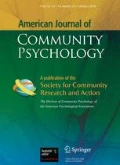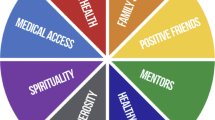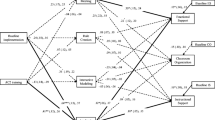Abstract
This paper examines whether three dimensions of school climate—leadership, accountability, and safety/respect—moderated the impacts of the INSIGHTS program on students’ social-emotional, behavioral, and academic outcomes. Twenty-two urban schools and N = 435 low-income racial/ethnic minority students were enrolled in the study and received intervention services across the course of 2 years, in both kindergarten and first grade. Intervention effects on math and reading achievement were larger for students enrolled in schools with lower overall levels of leadership, accountability, and safety/respect at baseline. Program impacts on disruptive behaviors were greater in schools with lower levels of accountability at baseline; impacts on sustained attention were greater in schools with lower levels of safety/respect at baseline. Implications for Social-Emotional Learning program implementation, replication, and scale-up are discussed.


Similar content being viewed by others
References
Aber, J. L., Jones, S. M., Brown, J. L., Chaudry, N., & Samples, F. (1998). Resolving conflict creatively: Evaluating the developmental effects of a school-based violence prevention program in neighborhood and classroom context. Development and Psychopathology, 10(2), 187–213.
Bierman, K. L., Coie, J. D., Dodge, K. A., Greenberg, M. T., Lochman, J. E., McMahon, R. J., & Pinderhughes, E. (2010). The effects of a multiyear universal social–emotional learning program: The role of student and school characteristics. Journal of Consulting and Clinical Psychology, 78(2), 156.
Bierman, K. L., Nix, R. L., Heinrichs, B. S., Domitrovich, C. E., Gest, S. D., Welsh, J. A., & Gill, S. (2014). Effects of head start REDI on children’s outcomes 1 year later in different kindergarten contexts. Child Development, 85(1), 140–159.
Bloom, H. S., Richburg-Hayes, L., & Black, A. R. (2007). Using covariates to improve precision for studies that randomize schools to evaluate educational interventions. Educational Evaluation and Policy Analysis, 29(1), 30–59.
Bradshaw, C. P., Waasdorp, T. E., & Leaf, P. J. (2012). Effects of school-wide positive behavioral interventions and supports on child behavior problems. Pediatrics, 130(5), e1136–e1145.
Brand, S., Felner, R. D., Seitsinger, A., Burns, A., & Bolton, N. (2008). A large scale study of the assessment of the social environment of middle and secondary schools: The validity and utility of teachers’ ratings of school climate, cultural pluralism, and safety problems for understanding school effects and school improvement. Journal of School Psychology, 46(5), 507–535.
Bronfenbrenner, U., & Morris, P. A. (1998). The ecology of developmental processes. In W. Damon & R. M. Lerner (Eds.), Handbook of child psychology: Vol. 1 Theoretical models of human development (5th ed., pp. 993–1028). New York, NY: Wiley.
Brown, J. L., Jones, S. M., LaRusso, M. D., & Aber, J. L. (2010). Improving classroom quality: Teacher influences and experimental impacts of the 4Rs program. Journal of Educational Psychology, 102(1), 153
Bryk, A. S., Sebring, P. B., Allensworth, E., Luppescu, S., & Easton, J. (2010). Organizing schools for improvement: Lessons from Chicago. Chicago: University of Chicago Press.
Cappella, E., Hamre, B. K., Kim, H. Y., Henry, D. B., Frazier, S. L., Atkins, M. S., & Schoenwald, S. K. (2012). Teacher consultation and coaching within mental health practice: Classroom and child effects in urban elementary schools. Journal of Consulting and Clinical Psychology, 80(4), 597.
Chess, S., & Thomas, A. (1984). Origins and evolution of behavior disorders. New York: Bruner/Mazel.
Childress, S., Higgins, M., Ishimaru, A., & Takahashi, S. (2011). Accountability and organizational learning in New York City reforms. In J. O’Day, C. Bitter, & L. Gomez (Eds.), Education reform in New York City: Ambitious change in the nation's most complex school system. Cambridge: Harvard Education Press.
Cicchetti, D., & Aber, J. L. (1998). Contextualism and developmental psychopathology. Development and Psychopathology, 10(02), 137–141.
Coburn, C., Penuel, W., & Geil, K. (2013). Research-practice partnerships: A strategy for leveraging research for educational improvement in school districts. In Working paper. New York: The William T. Grant Foundation.
Cohen, J., McCabe, E. M., Michelli, N. M., & Pickeral, T. (2009). School climate: Research, policy, practice, and teacher education. Teachers College Record, 111, 180–213.
Cooper, C. E., Osborne, C. A., Beck, A. N., & McLanahan, S. S. (2011). Partnership instability, school readiness, and gender disparities. Sociology of Education, 84(3), 246–259.
Durlak, J. A., Weissberg, R. P., Dymnicki, A. B., Taylor, R. D., & Schellinger, K. B. (2011). The impact of enhancing students’ social and emotional learning: A meta-analysis of school-based universal interventions. Child Development, 82(1), 405–432.
Eisenberg, N., Valiente, C., & Eggum, N. D. (2010). Self-regulation and school readiness. Early Education and Development, 21(5), 681–698.
Espelage, D. L., Low, S., Rao, M. A., Hong, J. S., & Little, T. D. (2014). Family violence, bullying, fighting, and substance use among adolescents: A longitudinal mediational model. Journal of Research on Adolescence, 24(2), 337–349.
Eyberg, S. M., & Pincus, D. (1999). Eyberg child behavior inventory and sutter-eyberg student behavior inventory-revised: Professional manual. Odessa, FL: Psychological Assessment Resources.
Feingold, A. (2009). Effect sizes for growth-modeling analysis for controlled clinical trials in the same metric as for classical analysis. Psychological Methods, 14(1), 43.
Garrison, W. M. (2004). Profiles of classroom practices in US public schools. School Effectiveness and School Improvement, 15(3–4), 377–406.
Greenberg, M. T., Weissberg, R. P., O’Brien, M. U., Zins, J. E., Fredericks, L., Resnik, H., & Elias, M. J. (2003). Enhancing school-based prevention and youth development through coordinated social, emotional, and academic learning. American Psychologist, 58(6–7), 466–474.
Hagelskamp, C., Brackett, M. A., Rivers, S. E., & Salovey, P. (2013). Improving classroom quality with the ruler approach to social and emotional learning: Proximal and distal outcomes. American Journal of Community Psychology, 51(3–4), 530–543.
Higgins, M., Ishimaru, A., Holcombe, R., & Fowler, A. (2012). Examining organizational learning in schools: The role of psychological safety, experimentation, and leadership that reinforces learning. Journal of Educational Change, 13(1), 67–94.
Hughes, J. N., Cavell, T. A., Meehan, B. T., Zhang, D., & Collie, C. (2005). Adverse school context moderates the outcomes of selective interventions for aggressive children. Journal of Consulting and Clinical Psychology, 73(4), 731–746.
Jones, S. M., Brown, J. L., & Aber, J. L. (2011). Two-year impacts of a universal school-based social-emotional and literacy intervention: An experiment in translational developmental research. Child Development, 82, 533–554.
Kahn, J. (2013). Can emotional intelligence be taught? New York Times. Retrieved July 2, 2014. http://www.nytimes.com/2013/09/15.
Kellam, S. G., Brown, C. H., Poduska, J. M., Ialongo, N. S., Wang, W., Toyinbo, P., & Wilcox, H. C. (2008). Effects of a universal classroom behavior management program in first and second grades on young adult behavioral, psychiatric, and social outcomes. Drug and Alcohol Dependence, 95, S5–S28.
Kumanyika, S. K., & Grier, S. (2006). Targeting interventions for ethnic minority and low-income populations. The Future of Children, 16(1), 187–207.
Lee, J. (2012). The effects of the teacher–student relationship and academic press on student engagement and academic performance. International Journal of Educational Research, 53, 330–340.
Liew, J. (2012). Effortful control, executive functions, and education: Bringing self-regulatory and social-emotional competencies to the table. Child Development Perspectives, 6(2), 105–111.
Little, R. J., & Rubin, D. B. (2002). Statistical analysis with missing data. Hoboken: Wiley.
McClowry, S. G. (2002). The temperament profiles of school-age children. Journal of Pediatric Nursing, 17, 3–10.
McClowry, S. G. (2014). Temperament-based elementary classroom management. Lanham, MD: Rowman & Littlefield.
McClowry, S. G., Snow, D. L., & Tamis-LeMonda, C. S. (2005). An evaluation of the effects of INSIGHTS on the behavior of inner city primary school children. Journal of Primary Prevention, 26, 567–584.
McClowry, S. G., Snow, D. L., Tamis-LeMonda, C. S., & Rodriguez, E. T. (2010). Testing the efficacy of INSIGHTS on student disruptive behavior, classroom management, and student competence in inner city primary grades. School Mental Health, 2, 23–35.
McCormick, M. P., O’Connor, E. E., Cappella, E., & McClowry, S. G. (2015). Getting a good start in school: Effects of INSIGHTS on children with high maintenance temperaments. Early Childhood Research Quarterly, 30(A), 128–139.
McCoy, D. C. (2013). Early violence exposure and self-regulatory development: A bioecological systems perspective. Human Development, 56(4), 254–273.
McCoy, D. C., Roy, A. L., & Sirkman, G. M. (2013). Neighborhood crime and school climate as predictors of elementary school academic quality: A cross-lagged panel analysis. American Journal of Community Psychology, 52(1–2), 128–140.
Meece, J. L., Anderman, E. M., & Anderman, L. H. (2006). Classroom goal structure, student motivation, and academic achievement. Annual Review of Psychology, 57, 487–503.
Nathanson, L., Cole, R., Kemple, J. J., Lent, J., McCormick, M., & Segeritz, M. (2013a). New York City School Survey 2008–2010: Assessing the reliability and validity of a progress report measure. Technical Report. Research Alliance for New York City Schools.
Nathanson, L., McCormick, M., & Kemple, J. (2013b). Strengthening assessments of school climate: Lessons from the NYC school survey. New York: The Research Alliance for New York City Schools. Retrieved from http://files.eric.ed.gov/fulltext/ED543180.pdf.
National School Climate Council. (2007). The school climate challenge: Narrowing the gap between school climate research and school climate policy, practice guidelines and teacher education policy. Retrieved from http://www.schoolclimate.org/climate/advocacy.
New York City Department of Education. (2014). Learning environment survey data. Retrieved July 3, 2014 from http://schools.nyc.gov/Accountability/tools/survey/default.htm.
O’Connor, E. E., Cappella, E., McCormick, M. P., & McClowry, S. G. (2014). An examination of the efficacy of INSIGHTS in enhancing the academic learning context. Journal of Educational Psychology, 106(4), 1156–1169.
Querido, J. G., & Eyberg, S. M. (2003). Psychometric properties of the sutter-eyberg student behavior inventory-revised with preschool children. Behavior Therapy, 34, 1–15.
Raghunathan, T. E., Diehr, P. K., & Cheadle, A. D. (2003). Combining aggregate and individual level data to estimate an individual level correlation coefficient. Journal of Educational and Behavioral Statistics, 28(1), 1–19.
Raver, C. C. (2002). Emotions matter: Making the case for the role of young children’s emotional development for early school readiness. Social Policy Report, 16(3), 3–19.
Raver, C. C., Jones, S., Li-Grining, C., Zhai, F., Bub, K., & Pressler, E. (2011). CSRP’s impact on low-income preschoolers’ preacademic skills: Self-regulation as a mediating mechanism. Child Development, 82(1), 362–378.
Reynolds, A. J., Temple, J. A., Ou, S. R., Arteaga, I. A., & White, B. A. (2011). School-based early childhood education and age-28 well-being: Effects by timing, dosage, and subgroups. Science, 333(6040), 360–364.
Rimm-Kaufman, S. E., Fan, X., Chiu, Y. J., & You, W. (2007). The contribution of the responsive classroom approach on children’s academic achievement: Results from a three year longitudinal study. Journal of School Psychology, 45(4), 401–421.
Rockoff, J., & Speroni, C. (2008). Reliability, consistency, and validity of the NYC environmental surveys: A preliminary analysis. In Working paper. New York: Columbia University Graduate School of Business.
Roderick, T. (2013). Brief on the smart school leaders program. Retrieved July 3, 2014 from http://www.morningsidecenter.org/smart-school-leaders.
Roid, G. H., & Miller, L. J. (1997). Leiter international performance scale-revised: Examiners manual. Wood Dale, IL: Stoelting.
Rothbart, M. K., & Bates, J. E. (2006). Temperament. In W. Damon, R. Lerner, & N. Eisenberg (Eds.), Handbook of child psychology: Vol. 3. Social, emotional, and personality development (6th ed., pp. 99–166). New York: Wiley.
Shadish, W. R., Cook, T. D., & Campbell, Donald T. (2002). Experimental and quasi-experimental designs for generalized causal inference. New York: Houghton Mifflin.
Singer, J. D., & Willett, J. B. (2003). Applied longitudinal data analysis: Modeling change and event occurrence. Oxford: Oxford University Press.
Snyder, F., Flay, B., Vuchinich, S., Acock, A., Washburn, I., Beets, M., & Li, K. K. (2009). Impact of a social-emotional and character development program on school-level indicators of academic achievement, absenteeism, and disciplinary outcomes: A matched-pair, cluster-randomized, controlled trial. Journal of Research on Educational Effectiveness, 3(1), 26–55.
Social and Character Development Research Consortium. (2010). Efficacy of schoolwide programs to promote social and character development and reduce problem behavior in elementary school children. Washington.
Supplee, L. H., Kelly, B. C., MacKinnon, D. M., & Barofsky, M. Y. (2013). Introduction to the special issue: Subgroup analysis in prevention and intervention research. Prevention Science, 14, 107–110.
Thapa, A., Cohen, J., Guffey, S., & Higgins-D’Alessandro, A. (2013). A review of school climate research. Review of Educational Research, 83(3), 357–385.
Tough, P. (2012). How children succeed. New York: Random House.
Tseng, V., & Seidman, E. (2007). A systems framework for understanding social settings. American Journal of Community Psychology, 39(3–4), 217–228.
Van Lier, P. A., Muthén, B. O., van der Sar, R. M., & Crijnen, A. A. (2004). Preventing disruptive behavior in elementary schoolchildren: Impact of a universal classroom-based intervention. Journal of Consulting and Clinical Psychology, 72(3), 467.
Webster-Stratton, C., Reid, M., & Stoolmiller, M. (2008). Preventing conduct problems and improving school readiness: Evaluation of the Incredible Years Teacher and Child Training Programs in high-risk schools. Journal of Child Psychology and Psychiatry, 49(5), 471–488.
Weissbourd, R., Bouffard, S. M., & Jones, S. M. (2013). School climate and moral and social development. School Climate Practices for Implementation and Sustainability, 30, 1–5.
Woodcock, R. W., McGrew, K. S., & Mather, N. (2001). Woodcock Johnson psychoeducational battery-third edition. Chicago: Riverside Publishing.
Zins, J. E., & Elias, M. J. (2006). Social and emotional learning. In G. G. Bear & K. M. Minke (Eds.), Children’s needs III: Development, prevention, and intervention (pp. 1–13). Bethesda, MD.
Zullig, K. J., Huebner, E. S., & Patton, J. M. (2011). Relationships among school climate domains and school satisfaction. Psychology in the Schools, 48(2), 133–145.
Acknowledgments
The research reported here was conducted as a part of a study funded by Grant R305A080512 from the Institute of Education Sciences and with the support of Institute of Education Sciences Grant R305B080019 to New York University. The opinions expressed are those of the authors and do not represent views of the Institute or the US Department of Education. The writing of this study was supported by an American Psychological Foundation Elizabeth Munsterberg Koppitz Dissertation Fellowship and a National Academy of Education/Spencer Foundation Dissertation Fellowship. Additional research costs were supported with dissertation grants from the Society for Research on Child Development and the New York Community Trust.
Author information
Authors and Affiliations
Corresponding author
Rights and permissions
About this article
Cite this article
McCormick, M.P., Cappella, E., O’Connor, E.E. et al. Context Matters for Social-Emotional Learning: Examining Variation in Program Impact by Dimensions of School Climate. Am J Community Psychol 56, 101–119 (2015). https://doi.org/10.1007/s10464-015-9733-z
Published:
Issue Date:
DOI: https://doi.org/10.1007/s10464-015-9733-z




